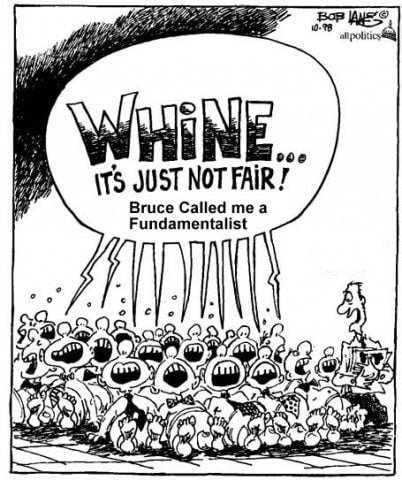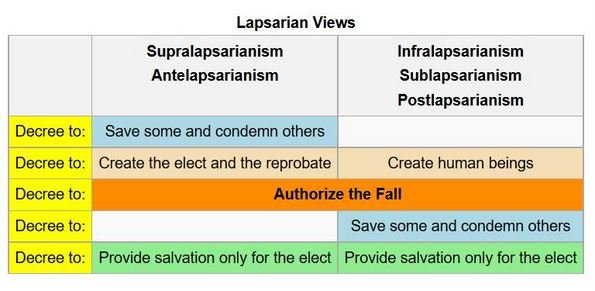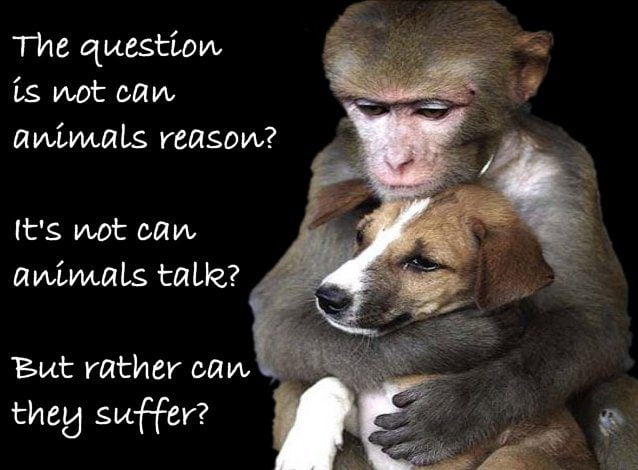
Warning! Lots of snark ahead. Easily offended Christians have been warned!
From the Isaiah 53:5 Project blog (no longer active). My comments are indented and in italics.
“But he was pierced for our transgressions, he was crushed for our iniquities; the punishment that brought us peace was on him, and by his wounds we are healed.”
– Isaiah 53:5
Jesus Christ left Heaven for YOU.
Jesus is God, right? So, when Jesus exited Heaven, it was left without a God? No, God the Father was still there. Wait a minute. I thought Christianity is a monotheistic religion. If there is a God on earth — Jesus — and a God in Heaven — the Father — doesn’t this mean that Christianity is actually a polytheistic religion?
How do you know Jesus left Heaven for me? Calvinists say that Jesus came to earth to only die for the elect — those predestined to salvation by God from before the foundation of the world. And doesn’t the Bible say that Jesus actually came to earth to die just for the Jews and that only after they rejected him did Jesus (God) decide to die for Gentiles?
Matthew 1:21 says: And she [Mary] shall bring forth a son, and thou shalt call his name Jesus: for he shall save his people [Jews] from their sins.
John 1:10-12 says: He was in the world, and the world was made by him, and the world knew him not. He came unto his own [Jews], and his own received him not. But as many as received him, to them gave he power to become the sons of God, even to them that believe on his name:
He left Heaven and entered a world He knew would hate Him, for YOU.
Jesus, God number two, came to earth because his Father, God number one, decided before he created the heavens and earth that he would send God number two to earth to be hated, physically assaulted, and killed. What kind of father sends his one and only son (well, God, according to the Mormons, has many sons) to a hostile environment, knowing that he will be viciously killed? Here in the 21st century, such a father would lose custody of his son and likely face criminal prosecution.
He endured beatings for YOU.
Actually, Jesus endured beatings because he pissed off his fellow Jews. Much like Fred Phelps, Jed Smock, and Steven Anderson, Jesus verbally attacked the Jewish religion and even went so far as to go into the Temple to physically assault people and destroy their property. In other words, Jesus is to blame for his ass-whooping, not me.
He was unimaginably tortured for YOU.
See previous paragraph. Yes, Jesus was tortured, but was it really as big of a deal as Evangelicals make it out to be? The United States government tortures people they deem terrorists for weeks, months, and years. Jesus suffered torture for about twenty-four or so hours. I know of people who have suffered with unrelenting pain and agony for decades. Oh, how they wish they could suffer as Jesus did and then be done with it. (Please see I Wish Christians Would be Honest About Jesus’ Three Day Weekend.)
He suffered for YOU.
See previous two paragraphs. Since Jesus, according to orthodox Christian theology, was fully God and fully man, does this mean God can suffer; that a perfect, sinless being can experience physical pain? I thought, as John 4:24 states, that God is a spirit. How, exactly, does a spirit suffer?
He hung on a cross for YOU.
See previous paragraphs. I think the record is stuck. Please bump the needle.
He shed his blood for YOU.
Christianity is a blood sacrifice cult, as is Islam, Judaism, and a host of other human religions. What’s with all the bloodshed? Couldn’t God have designed a better way of redeeming man from their sin? Why require the bloody sacrifice of innocents? Centuries ago, some religions sacrificed humans. Christians say these other religions are cults. Why is one human sacrifice right and another wrong? The Bible condemns the worshipers of Molech for offering their children as sacrifices, yet offering Jesus as a sacrifice or eating his body and drinking his blood every Sunday during communion are acts worthy of veneration and worship. Seems hypocritical to me.
Christians are divided as to for whom Jesus shed his blood. Did Jesus shed his blood for everyone, as Arminians claim? Or did Jesus shed his blood only for John Calvin’s elect? Or perhaps the Christians sects who believe that Jesus’ blood atonement was sufficient to save everyone, but only efficient to save the elect (Amyraldism) are right. Or maybe the Universalists are right — that Jesus’ blood sacrifice provides salvation for everyone regardless of belief.
So much blood, so many confusing, contradictory beliefs about Jesus’ shed blood. Why didn’t the writer of the Bible — God — make it clear exactly who it is that is covered by Jesus’ blood sacrifice?
He died for YOU.
I think I have snarkily established that Christian sects are divided over for whom Jesus died. From a historical perspective, Jesus didn’t die for anyone. He was executed at the behest of the Jews by the Roman government because he was viewed as a threat to the established order. At best, Jesus was executed because his political beliefs were causing social unrest — that is, if the secondhand reports recorded in the Bible are true. If, as Evangelicals claim, Jesus was/is a world-changing figure, why is there virtually no mention of him outside of the Bible?
I didn’t ask Jesus to die for me, nor did anyone else. God created us, gave us the capacity to sin, and then, when we act of the nature given to us by him, he requires that blood sacrifices be made to satiate his anger; anger, I might add, that should be directed at himself. If I create a car, fill it with gas, start it, and put the car in gear, only to have it go driverless down the road careening into bystanders, who is to blame? Not the bystanders. We humans are mere bystanders in the Christian God’s sordid morality play. God could have chosen a different path, but he didn’t. This is the best humans, uh I mean God, could come up with?
Amazing, isn’t it?
No, actually it is not. There’s nothing amazing about the blood sacrifice of Jesus. There’s nothing amazing about his suffering. There’s nothing amazing about his death. Jesus’ story is one of failure, that of a man who went against the political and religious powers of his day and lost. His story is repeated daily in countless places as people stand against oppression, only to end up imprisoned or killed. Instead of wallowing in the blood of Jesus, the world would be better served if Christians focused on reducing suffering and eliminating the bloody slaughter caused by war. You know, quit talking and start doing.
I have never asked anyone to die for me, nor would I. I recognize that police officers and soldiers might be called on to keep me safe. These are jobs that they have chosen to do. I would never ask anyone to die on my behalf. When someone says that American soldiers are fighting in the Middle East so I can enjoy life in the land of the free and home of the brave, I say, not for me! I would never ask such a thing. Bring all the soldiers home, today. Of course, the troops will not be brought home, betraying the fact that the real reasons for their deaths are imperialistic American ambitions and corporate profits.
There are certainly times when human death for others is worthy of praise and remembrance. Dying to protect and save others is certainly noble, and I honor those who have given their lives for others. Such people are heroes — hero being a word robbed of its significance by its shallow, frequent use. The death of Jesus is not worthy of such a designation. Think about it for a moment. Ponder the whole God/creation/Adam-and-Eve/Satan/original-sin/blood-sacrifice/Jesus/redemption/salvation/death/heaven-or-hell story line. Does any of it make any sense to you? When viewed with eyes that have not been colored by religious indoctrination, this story sounds like some sort of Stephen King novel — soon to be adapted into a feature film for the SyFy channel.
Why is that Christians never ask God WHY? Why this sordid story of animal and human sacrifices? Why the creating of Satan just so he could tempt humans to sin? Why create humans with a capacity to sin? If all of this was just a coder’s work gone awry I would understand. But, according to Christians, their God is all-knowing, all-seeing, and all-powerful. THIS was the best the Christian God could come up with? According to a Ken Ham-reading of the Bible, four thousand years ago, God killed every human, save eight, by drowning them in a worldwide flood. Millions of people died. Here was God’s chance to start over with just eight supposedly God-fearing humans. And what did these humans do? Got drunk and had incestuous sex. Why didn’t God kill Noah and his family and start over? Why didn’t God put an end to Satan and demons? Why did God kill millions of people because they committed execution-worthy sins, only to reboot the world without changing anything?
Didn’t God learn anything from the Human 1.0 experiment? Evidently not. Two thousand years after Noah’s flood, God decided he had to do something about the Human 2.0 experiment. God became human (much like he did when he walked in the Garden of Eden with Adam and Eve), traveled to earth, was born of a virgin, lived a sinless life for thirty-three years, only to commit suicide on a Roman cross. (Suicide? Therefore doth my Father love me, because I [Jesus] lay down my life, that I might take it again. John 10:17) And now, for two thousand years God is conducting the Human 3.0 experiment. And if the book of Revelation is to be believed, this experiment will also end in horrific violence and bloodshed.
It seems to me that God is having a hard time getting things right; that try as he might his multi-player action games are riddled with bugs — coding errors that often cause the games to either reboot or stop working. Perhaps it is time for another coder to try his hand at creation. Sorry God, you’ve been fired.
Christianity would be better served if the bronze-age blood sacrifices and cult worship found in the Bible were excised from its pages. Thomas Jefferson was on to something when he took a pair of scissors to the Bible. Instead of a God who became a man, we could have a sage who uttered sayings and teachings worthy of emulation. Few would argue with the value of such teachings. Human sacrifice? Blood sacrifice? These are relics best left in the dust bin of human history.
Bruce Gerencser, 68, lives in rural Northwest Ohio with his wife of 47 years. He and his wife have six grown children and sixteen grandchildren. Bruce pastored Evangelical churches for twenty-five years in Ohio, Texas, and Michigan. Bruce left the ministry in 2005, and in 2008 he left Christianity. Bruce is now a humanist and an atheist.
Your comments are welcome and appreciated. All first-time comments are moderated. Please read the commenting rules before commenting.
You can email Bruce via the Contact Form.











